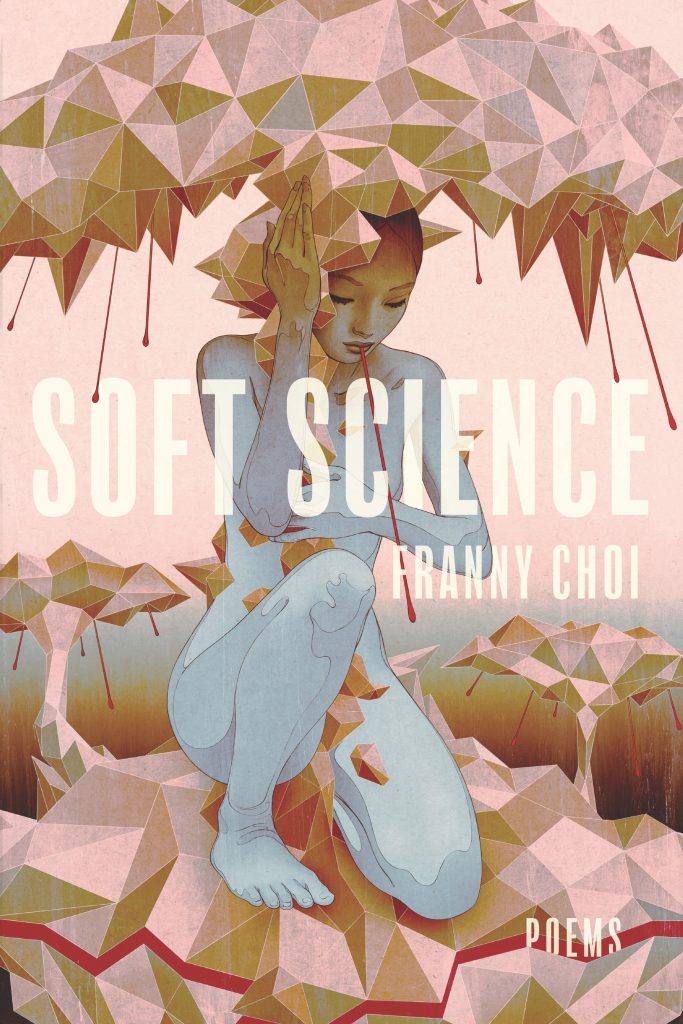
(Alice James Books, 2019)
REVIEW BY DANA ALSAMSAM
—
Franny Choi’s Soft Science begins with a quote from Donna Haraway: “We are excruciatingly conscious of what it means to have a historically constituted body.” This sounds at first like a Butlerian critique of societally constructed gender roles. But upon looking into Haraway and discovering her expertise in cyborg’s as a feminist post-humanist argument, it becomes clear how Haraway’s quote relates directly to Choi’s collection. In critique of traditional feminist theory, Haraway uses the cyborg to deconstruct boundaries, not just of gender, but also of the boundary between the human and the other (the animal or the machine). Soft Science takes on these boundaries full force. As the collection goes on, we sometimes forget if the speaker is a cyborg or a human, and this confusion is intentional. This more politically charged quote is immediately juxtaposed with a much softer, humanizing quote from writer Bhanu Kapil. This juxtaposition becomes characteristic of the collection which places heartbreaking and humanizing poetry about the intrinsically gendered, political experiences of the poems’ speaker next to cyborg poetry that feels (and sometimes is) computer generated.
A series of poems called “Turing Test” begins each section, mimicking the experiment which tests how well computers can simulate human speech. These poems shimmer at meaning but don’t arrive at it. They instead use constellations of language society associates with queer, Asian, femme people, and we leave these poems with the feeling of perceptions that are constructed: from phrases like “duck duck roll” to “sodium bicarbonate” to “undress me anywhere,” we see this piece as reflective of a cultural machine that takes the other in, labels them, and spits them back out with a prescribed vocabulary for identity.
This feeling of artificial construction continues in one of the first poems of the collection, “Making Of,” which I feel is exemplary of the collection’s themes in both the cyborg poetry and the poetry embodied by a human speaker. It begins with the lines: “When a cyborg puts on a dress, / it’s called drag. // When a cyborg gets down / on her knees, it’s called // behavior.” This immediately recalls the initial quote from Haraway and the idea of gender performativity. Because the cyborg is man-made but appears natural and human, it becomes an avatar in this collection for the cultural construction (the man-made construction) of the collection’s speaker. The speaker goes on to eat both of her hands: “Each digit, // a salty word whose meaning / furred my teeth.” Here the speaker tries to make sense of her own body, to put it into language but only given the vocabulary that society allows, meaning comes out illegible, furry.
The woman speakers in this collection are constantly attempting to uphold the pressures and expectations placed on women but are simultaneously burning with a desire to be seen—not read for meaning but understood. In “Acknowledgements,” the speaker says, “I’m / still smiling, smiling until my gums crack, until / I’m a photograph.” And then in “Shokushu Goukan for the Cyborg Soul,” a play on the Chicken Soup for the Soul collection, the speaker says, “so I am both the woman holding the camera and the woman / being opened by it—nothing special about that.” The cultural expectation of women is so deeply ingrained that they uphold and regurgitate these norms, become the image they are told to be. This collection shows women picking up behavior or appearance because, in some way, they are told to, or don’t know how else to be.
All of the subtle gender theory scaffolding the collection does wonders when we land on intimate, personal poems from a human speaker who longs for love and understanding, so much so that she finds freedom in promiscuity, and later experiences shame. This cycle of emotions is familiar and relatable for many young women. Fulfilling their desires is impossible when they are sexualized but then shamed for the actual act of sex. Even the shame is constructed. Next to the cyborg poems which evoke ideas of culturally constructed and performative ideas of gender, these poems about the inherently gendered experiences of a femme body entering the cultural machine are deeply impactful.
I’ll end with a piece that resonated like no other. Unlike the tables, slashes and prose blocks that create the marked experimental queerness of the collection, “On the Night of the Election” remains simple in short 3-5 word lines utilizing standard punctuation. Here, the speaker recalls the night He was elected, a night which, as a queer femme and child of an immigrant myself, still brings tears to my eyes. The speaker masturbates in a hotel room while watching the news and contemplating numbness—of the body, of our country—and what it means to feel hopeless under an administration that not only labels the other but despises the other. This piece requires no explanation:
“is there anything that works
that isn’t a machine for killing
or doomed to collapse or stolen
from the sweat of the hungry?
Maybe my body was all three,
there, in the hotel room,
liquor-shot and reaching
in every direction
for an answer,
a complete sentence, or,
if nothing else, an exit,
a view, at least, of what
waits on the other side
of despair…
—
Dana Alsamsam is the author of a chapbook, (in)habit (tenderness lit, 2018), and her poems are published or forthcoming in The Massachusetts Review, North American Review, The Shallow Ends, Salamander, BOOTH, The Common as well as critical work in The Rumpus. Her work has been supported by a fellowship from Lambda Literary’s Writers Retreat for Emerging LGBTQ Voices.

![[PANK]](https://pankmagazine.com/wp-content/themes/pank/assets/images/pank-logo-large.png)

